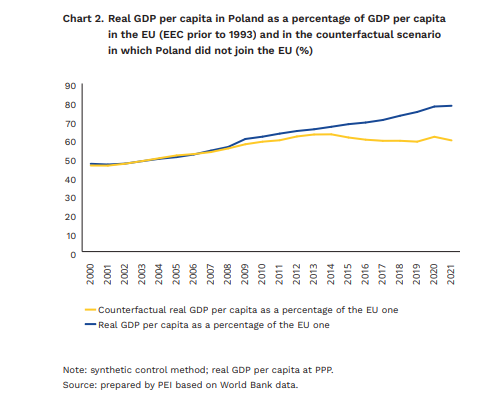Without EU membership, Poland’s GDP per capita would be 31% lower
Published: 24/07/2023
1 January 2023 marked 30 years since the establishment of the European single market, which Poland has been benefiting from for over 18 years. Poland derives significant economic advantages from European Union membership. If it were not part of the single market, Poland's GDP per capita would be 31% lower and amount to 60% of the EU average. In 2018, almost a quarter of the country’s GDP was indirectly or directly dependent on the EU, and the demand from end consumers in Germany alone generated 1.15 million jobs. These are the conclusions of the Polish Economic Institute’s report entitled How Poland benefits from the single market.
Poland’s GDP per capita based on purchasing power parity is currently around 31% higher than if it had not joined the EU.
“If it were not part of the single market, Poland’s GDP per capita in 2021 would be at its 2014 level; EU membership has therefore boosted it by nearly 1.5 pp per year. This is a very tangible indicator that translates into wages, company incomes, state budget revenues and, consequently, a higher standard of living for Poles within the EU. Between 2004 and 2018 alone, the share of Polish GDP generated by demand in other EU countries increased from 15.6% to 21.2%,” says Marek Wąsiński, head of the world economy team at the PEI.

Poland has a high trade surplus in goods with other EU member states. Depending on the method used to present imports, it amounted to either EUR 24 billion (imports by country of dispatch) or EUR 60 billion (imports by country of origin) in 2021. Exports grew more rapidly than imports: between 2004 and 2021, there was a 4.5-fold increase in exports, compared to a 3.2-fold increase in imports by country of dispatch and a 3.5-fold increase in imports by country of origin. Polish exports of goods to the EU, which accounted for 75% of the country’s total exports, reached EUR 216 billion in 2021.
“Close trade cooperation with the EU has enabled Poland’s economic success and that of Central Europe as a whole. It was mainly exports that contributed to Poland’s GDP growth after it joined the EU. Two-thirds of the country’s economic growth can be attributed to exports. In 2018, over 3.3 million jobs in the country resulted from Thanks demand for goods and services containing Polish added value in Poland. Currently, every fifth job in Poland depends on demand created in EU countries,” says Jan Strzelecki, a member of the world economy team at the PEI.

***
The Polish Economic Institute is a public economic think-tank dating back to 1928. Its research primarily spans macroeconomics, energy and climate, the world economy, economic foresight, the digital economy and behavioural economics. The Institute provides reports, analyses and recommendations for key areas of the economy and social life in Poland, taking into account the international situation.
Media contact:
Ewa Balicka-Sawiak
Press Spokesperson
T: +48 727 427 918
E: ewa.balicka@pie.net.pl
Category: Press releases / Report / Reports 2023





